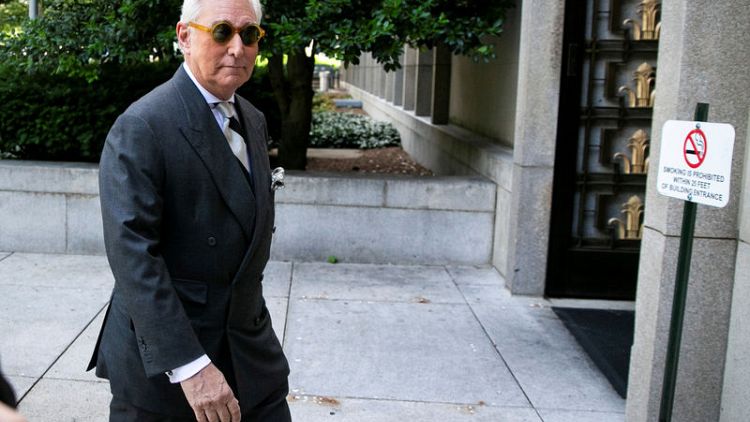WASHINGTON (Reuters) - Lawyers for Roger Stone, a former political adviser to President Donald Trump, on Thursday denied accusations by prosecutors that he violated a court-imposed gag order by posting comments on social media about former Special Counsel Robert Mueller's investigation.
In a filing with the U.S. District Court for the District of Columbia, Stone's lawyers said he was exercising his First Amendment rights within the confines of the gag order.
"Seeking to hold Roger Stone in contempt when he has sought to (and has) complied with the Court's Order, is not appropriate," they wrote.
Last week, prosecutors accused Stone of trying to "fan the flames" and poison the jury pool ahead of his November trial. They asked Judge Amy Berman Jackson to hold a hearing to consider changing his conditions of release, which could potentially land him behind bars.
"Stone's posts appear calculated to generate media coverage of information that is not relevant to this case but that could prejudice potential jurors," prosecutors wrote in a court filing. They said the posts relate to his claims that Russia did not hack Democratic computer servers in the 2016 presidential election.
Prosecutors said Stone posted comments on June 18 and 19 on Instagram that referenced articles expressing scepticism of Mueller's probe, and Stone questioned why some media outlets were not covering the developments.
Stone's lawyers said his posts "are not 'statements,' nor do they pose a danger to the fair trial concern," which was the reason for the gag order.
A spokeswoman for the U.S. attorney's office declined to comment.
In February, Jackson ordered Stone to stop publicly speaking about the case after he posted a photo of her next to the image of gun crosshairs on his Instagram account. Jackson warned Stone he would not have a second chance if he failed to abide by her order.
Stone is one of 34 individuals who were snagged as part of Mueller's probe into Russian interference in the 2016 U.S. election.
He has pleaded not guilty to charges of making false statements to Congress, obstruction of justice and witness tampering.
(Reporting by Eric Beech; Editing by Richard Chang and Leslie Adler)
